I watched Russian propaganda for a whole day – even Hungary's public media is easier to stomach
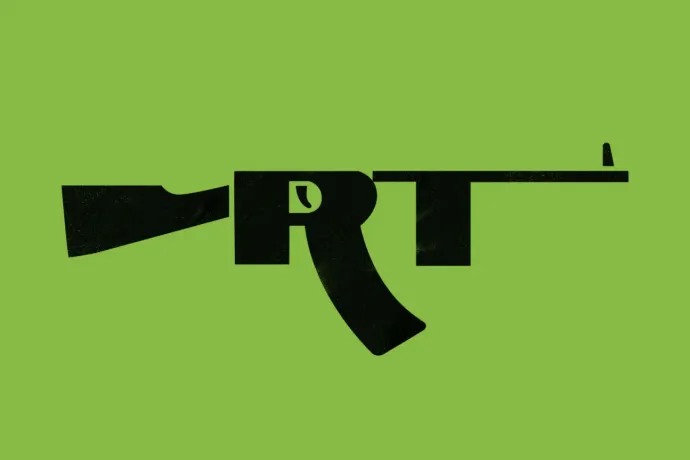
For the fourth time, I sit through a program where people talking over one another discuss how the West is to blame for the invasion of Ukraine and how the Mariupol theater was not actually bombed by Russians but by Ukrainians themselves. A guy in a bow tie furiously insists on freedom of speech and denounces the West's obstruction of any meaningful dialogue about the war in Ukraine. I just sit there staring, and I reflect on how if someone were to only get their information from Russia Today they wouldn't have the slightest idea about what exactly is going on in Ukraine – rather, they would simply be subjected to the same series of images over and over again. For an entire day, I watched the news on the Russian TV network RT. Translated by Dominic Spadacene
RT (formerly Russia Today) is a Russian state-controlled international television network that broadcasts in several languages around the world, and until recently, its programs were also available on YouTube. RT has been incredibly important for the Russian government and President Vladimir Putin since 2008, and it is a state organization of strategic importance for Russia. Despite the fact that, for years, media watchdogs have been calling out RT for being biased, one-sided, a source of disinformation, and guilty of presenting certain conspiracy theories as factual, until the outbreak of the war in Ukraine, only a few European countries had taken the network off the air. Even in the US, the only requirement imposed on RT was in 2017 when RT America was compelled to register as a foreign agent. Nevertheless, it was still permitted to broadcast freely.
What can be drawn from this is that RT essentially serves Russia's political and communication goals to spread the Kremlin's narrative all over the world. That is why the channel was banned across Europe after Russia launched a war in Ukraine. Nevertheless, we managed to find an alternative access point without much trouble.
Although the channel is blocked on Youtube, we came across RT's live broadcast on the Canadian platform Rumble, which is very popular among the political right in the US and proudly proclaims itself to be "immune to cancel culture." Many of the far-right and/or conspiracy-theory propagating content creators who were banned from YouTube and Facebook have fled here in recent years. They also get a lot of traffic from Parler (also known as "alt-right Facebook"), but even Reuters offers content on the platform, and they have previously collaborated with Donald Trump in the past as well.
One of Rumble's main investors is Paypal co-founder and billionaire Peter Thiel, who once contributed to the bankruptcy of Gawker Media. Thiel was also an enthusiastic supporter of the Trump campaign and is still a major financial backer of his movement. With that said, the fact that RT's broadcast on Rumble had never been watched by more than three thousand people before the time of this article's writing is an entirely different matter.
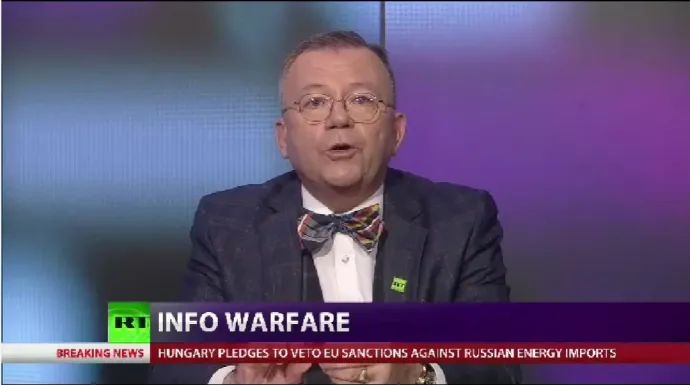
Talking heads in place of facts
Something that struck me during my RT marathon was that, for a Kremlin propaganda outlet aimed specifically at an international audience, the content was rather meager and almost mind-numbingly boring. This is partly because the channel runs a surprising amount of its content over and over. Moreover, even though there is a war going on in the country's vicinity, the news stream is hardly ever updated.
That morning I was lucky enough to catch its debate program, CrossTalk, which was subsequently re-broadcasted in its entirety 3 to 4 times over the course of the day. It's safe to call this is a way of force-feeding opinions, considering the fact that on normal TV channels, such a program is rebroadcasted at most once or twice a day – not four times (unless we're talking about Viktor Orbán's March 15th speech on Hungary's state-run media).
CrossTalk is hosted by an American fellow by the name of Peter Lavelle, who is roughly the equivalent of what you get when you try to make a John Oliver out of Zsolt Bayer, András Bencsik, and Balázs Bende. The slightly neurotic, bow-tie-wearing Lavelle has been living in Eastern Europe and Russia for 30 years now and working for RT since 2005, where he is known as one of the most trusted Putin supporters. He has previously referred to Putin as the most popular man in modern history and a savior of sorts, among other things.
Actually, Lavelle's show would fit right into the Hungarian government's media, not only in content but also in terms of editorial principles. He brings guests on the program (generally via video call) to comment on world politics and public affairs. On Tuesday's broadcast (and rebroadcasts), Lavelle's interlocutors included:
- Scottie Nell Hughes, an American journalist and avowed Trump supporter who has worked for Fox News and CNN. At Fox, she made the news after accusing the network's host Charles Payne of rape. Nothing was uncovered during an internal investigation, and Hughes later stated that she had had a sexual relationship with Payne for two years in order to get a more permanent position at the network. Before joining RT in 2018, she had another notable incident when she confused the word "Molotov" in "Molotov cocktail" with "mazel tov" (a Jewish expression of congratulations or good luck) during a live interview broadcast on CNN the day before the 2016 US presidential election.
- Pepe Escobar, a Brazilian journalist and geopolitical analyst who predicted back in 2001 that Osama bin Laden posed a serious threat to modern civilization. Escobar has been appearing for years as a specialist on RT and another important Russian state media outlet, Sputnik. And since 2020, his publications have been frequently used by Russian propaganda. According to his critics, Escobar is an anti-Western intellectual who is deliberately trying to sow discord between Russia, Ukraine, and Poland.
- Anya Parampil, a journalist who worked with former RT correspondent Abby Martins. In addition to RT America, she is credited as a journalist for the investigative portal The Grayzone. The Grayzone, a far-left news website noted for pushing conspiracy theories, is best known for its support of authoritarian regimes, denial of the Uyghur genocide, and an explicitly pro-Kremlin perspective on Russian events. This is probably why the Chinese state makes direct reference to Grayzone material so often. At the same time, their website also contains claims such as the idea that the Mariupol theatre may not have been bombed by Russians but in fact by Ukrainians in order to secure NATO's intervention.
During the show, it was quite difficult to follow exactly what the participants were talking about. Eventually, it turned into one big press club meeting, where the guests and host alike were interrupting one another, swearing, and making some rather serious allegations about the United States or anything, really. Among other things, they brought up the idea that journalists are afraid to report what's truly going on for fear of being canceled. And Fox News' Tucker Carlson was referred to as the most popular American anchor of all time (the anchor is also beloved by Hungary's government) who some wish to put in jail for treason. (Last week, detailed instructions were leaked from the Russian government regarding how the state media should communicate about the war, including the need to feature and praise Carlson as much as possible.)
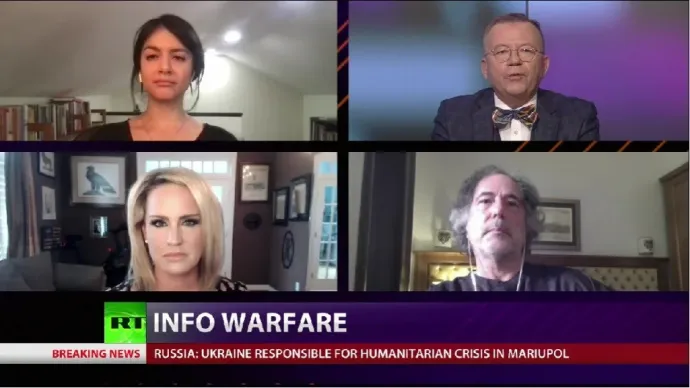
Interestingly, CrossTalk starts off in a rather measured and detached manner, but by the end, everyone gets so into it that even the presenter is almost shouting profanities. The Brazilian expert, who is currently in Turkey, boasts that at least in that country Sputnik and RT are not censored, whereas he is afraid to travel to Europe as he would be arrested immediately at Charles de Gaulle Airport. Naturally, a few buzz phrases were sprinkled in here and there, such as "the deep state" or "the war-loving media", but the strongest claim was undoubtedly made by Scottie Nell Hughes. She was flabbergasted that there's all this talk in the press about murders and massacres but not a single piece of photographic or video evidence to back it up. She believes that it's just an attempt by Ukrainian propaganda to mislead by showing people huddling in subway stations in Ukraine – a claim to which the host strongly nodded in agreement.
(As a matter of fact, there is plenty of photographic and video evidence of all this. In particular, Telex field correspondents have also produced video and photo reports of people and their babies overnighting in Kyiv's metro stations. And the devastation of the war is reflected in many of our reports: at the bombed barracks in Mykolaiv in southern Ukraine or among civilians in and around the city itself. The systematic destruction of Mariupol is also well documented.)
Then the Grayzone's journalist chimed in and went on at length about how they are trying to pin the Mariupol theater bombing on the Russians. However, all the participants were talking in circles and constantly cutting each other off to such an extent that it all turned into a contest of one-upping what was last said:
- Lavelle calls Republican Senator Marco Rubio a buffoon for denying that Ukraine is developing chemical weapons in laboratories (something we wrote about in detail here). He is also outraged that the late Senator John McCain, also a Republican, shook hands with Maidan revolutionaries in the past. Moreover, he believes that the West is isolating itself from the rest of the world because of this war.
- They often brought up the laptop of Joe Biden's son, Hunter Biden, and went on to say that people in America are very unhappy with Biden's policies.
- According to Hughes, the Russians are deliberately letting the world see how terrible war is.
- Escobar notes that, unlike him, Western media hasn't been covering the events in Donbas at all for the past eight years despite evidence of genocide being committed by Ukrainians (an untruthful claim, as it is stated). Later, he also talks about how in China, people have clear and easy access to any sort of information.
- It is mentioned that people in the West do not even know what denazification and demilitarization mean and that Americans aren't even able to point out Ukraine on a map. (As to what is actually the case regarding Russia's Nazi accusation against Ukraine, check out another one of our articles.)
- Lavelle considers US politicians morons because he feels that they are destroying the dollar's value.
Lavelle opens the program by saying that there is an information war going on, that the West is obstructing any meaningful dialogue, that freedom of speech is now a thing of the past, and that the great powers have created an informational iron curtain (in reality, as we have demonstrated before, the censorship of the Russian government is the main reason why this iron curtain is coming down). And all of this was broadcasted at least four times in under 12 hours.
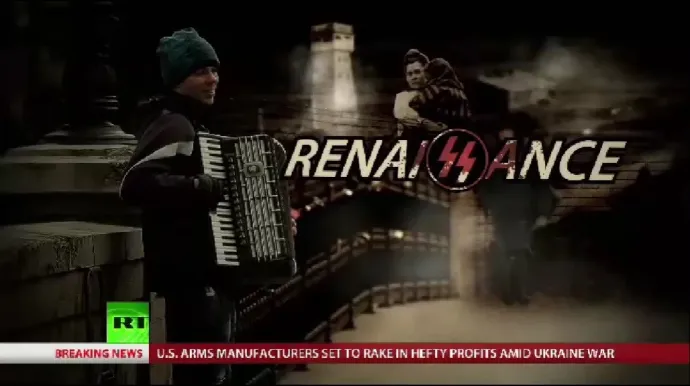
Nazis and evil Americans everywhere you look
In addition to CrossTalk and the occasional news segment – more on the latter later – RT also puts a lot of emphasis on presenting rather professional-looking documentaries. Or, perhaps "cramming down viewers' throats" better describes it, considering the fact that the documentaries Clear Torture (about the US' torture methods) and Coups R US (about various US-backed military coups) were shown at least three times in a single day.
These documentaries show the dark side of America, and they are similar in quality to the war documentaries one might find on the History Channel or Discovery. The only difference is that RT produces them explicitly. The two aforementioned documentaries showed many more Latvian, Lithuanian, Polish, and Ukrainian Nazis and former Holocaust survivors. The latter is particularly interesting because for some reason the documentary, which blurs the line between historical and modern Nazis, focuses exclusively on the countries that now potentially feel most threatened by Russian aggression (Poland, Ukraine, Estonia, Latvia).
For as important RT is as a platform for Russian propaganda in theory, there were relatively few proper news segments, and even then, they mostly repeated the same stories and headlines. Only very rarely did they squeeze in a new development (for example, the fact that from now on, Putin will – or would – accept payments in rubles from unfriendly countries for gas and oil).
We were not very surprised by how the news had been edited. As with all the other shows, neither did they allocate time to any voice that was critical of Russia, but it cannot be said that they completely suppressed everything. The word 'war', for example, was used several times, but only by Westerners. Even the British anchor Nikki Aaron (who used to work for Chinese state TV) only referred to the Russian invasion as a special military operation or demilitarization, as mentioned in mainstream Russian communications.
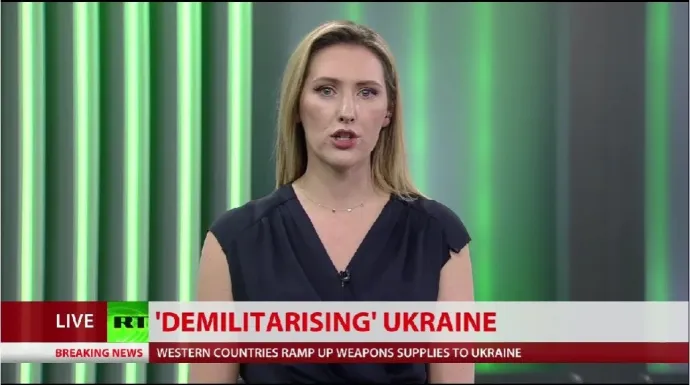
In the news segment, care was taken to keep the focus on Russian narratives that were anti-Western and anti-EU:
- They reported on anti-vaccine, far-right Eurosceptic and Italian MEP Francesca Donato, who had voted against the Russian sanctions, which she believes is why Facebook temporarily suspended her page. Donato later spoke out, accusing the West of demonizing Putin and Russia and the EU of failing to uphold democratic standards.
- People in Donetsk talked about how the Ukrainians were killing and bombing them and that their mayor had fled, leaving starving families to fend for themselves. Armed Russian soldiers were regularly visible alongside the speakers.
- There was talk that US arms manufacturers stand to profit handsomely from the war.
- The Canadian writer and analyst Yves Engler, often accused of anti-Semitism, said that America wants Ukraine to become another Afghanistan.
- One of the banner headlines was about Ukrainian President Volodymyr Zelensky banning all opposition parties in Ukraine. Later it was said that there were no pro-Russian parties in Ukraine, but only those who looked after their own interests. A correspondent joining in from Ukraine repeatedly stressed that he was only reporting the facts, but when he brought up the banning of opposition parties, he added, in a manner reminiscent of Balázs Németh [an anchor of Hungary's public news network], that "well, this is very democratic."
- There was also talk of looting, lynchings, and even public floggings happening all over the country due to a lack of control by the Ukrainian government, although no sources were mentioned in the news.
- There was loads of coverage about how gasoline had become more expensive because of the Americans and how people around the world were disgruntled by it.
The starkest scene – one evocative of Hungary's public media – without a doubt was one that happened during a news segment regarding something said by Gordon Brown. The former British Prime Minister had recently said that Putin should be prosecuted for war crimes, to which the British anchor was visibly beside herself. She added that critics consider the British duplicitous because they forget the invasion of Iraq, in which they were involved (although it was not made clear who the critics were). This assertion was then backed up by a former Indian foreign secretary and ambassador who, even more indignantly than Nikki Aaron, took exception, saying how dare the British, with such a bloody past, call anyone a war criminal. To this, the British anchor replied, so why is no one calling former British prime ministers war criminals?
But what was hardly touched upon was the actual war in Ukraine.
While a serious portion of the Hungarian press offers minute-by-minute coverage on every detail of the Russian-Ukrainian conflict, all that RT managed to report over an entire day was that there was fighting outside of Kyiv, that the Ukrainians had caused a humanitarian disaster in Mariupol, and that the Russians were continuously rescuing civilians, while the neo-Nazi Azov Battalion was bombing theaters and civilians.
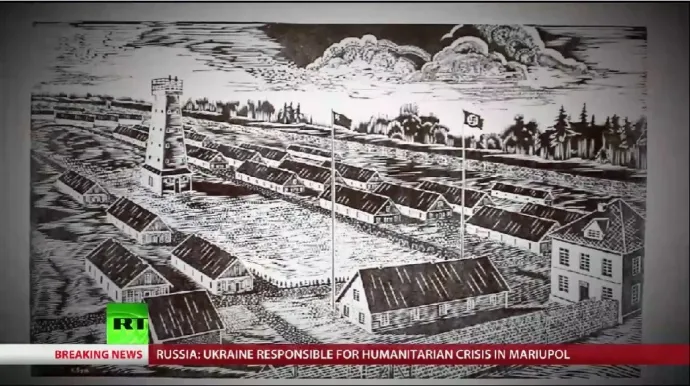
There was also a small Hungarian reference in the Russian propaganda: from early in the morning until the following afternoon a banner headline saying that Hungary had vetoed sanctions on Russian energy imports flashed across the screen almost every ten minutes. This is the kind of pro-Russian news that, like other such reports, RT shows in its news feed for more than 24 hours.
Similarities with Hungarian public media
Hungary's public media, especially the M1 news channel, has been criticized for pushing Russia's position on the war and for regularly inviting experts onto its programs who express similar views to those that can be heard on RT. It is also striking that there are no dissenting voices on either M1 or RT. There is no opportunity for the other side to make its case (granted, in Hungary, because of the elections, even opposition representatives have each been allotted five minutes). They create a pro-Kremlin narrative with various talking heads.
As can be seen from the mix of guests invited to CrossTalk, all the experts are in some way committed to the Russian position or dependent on the Russian state, whether by working directly or indirectly for a state organization. This trend can also be observed in Hungary's public media, where there is a revolving door of researchers and analysts from the Századvég or Nézőpont Institutes who appear on the channel. There have also been examples of the interviewer themself feeding the expert the lines to be said.
What M1 certainly has going for it, however, is that while the content is brutally one-sided, it is at least a little more varied, and the news is also updated more often. In contrast, RT repeats the same few bits of content over and over again, and it's not at all clear whether this is its very intention or because the mass resignations and international bans have led to a shortage of manpower and supplies.
Since 2014, several Russian and foreign editors, correspondents, and anchors have left RT. Some resigned over disinformation about the invasion of Crimea, others over the shooting down of a Malaysian airliner and related reports. Then there's also the former editor-in-chief who said Putin had ruined Russia's reputation and economy with this war. Since the start of the Russian invasion, nearly a dozen international staff members have left the channel, including an anchor who had been with RT since 2006.
The not-so-robust, somewhat incoherent disinformation is only enough for what Péter Krekó, Executive Director of the Political Capital Institute, and András Rácz of the National University of Public Service's Strategic Defense Institute talked about in 444's podcast:
It is no longer the Russians' aim to make everyone believe their narrative – rather, they will be satisfied if, through the chaos of disinformation, they can make it such that no one believes anything.
If you liked this article, and want to make sure not to miss anything from Telex English in the future, make sure to subscribe to our newsletter!